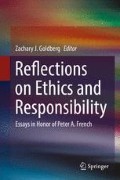Abstract
Appealing to Frankfurt examples, Peter French concurs that persons can be morally blameworthy for what they have done even if they could not have done otherwise (the “lesson”). However, if “ought not” implies “can refrain from” and “ought not” is equivalent to “impermissible,” it follows that moral impermissibility requires avoidability. But, then, if the popular principle that one is blameworthy for an action only if it is impermissible for one to do it is true, the lesson should be renounced. In this paper, I suggest that French has the resources to reject this popular principle and, hence, can escape this conundrum. I then give additional reasons against this principle by drawing on some of French’s insightful thoughts about heroism and responsibility. Finally, I introduce cases in which, owing to one’s character, on various occasions one cannot do otherwise. These cases are used as a springboard to explore, briefly, whether determinism or its falsity (indeterminism) threaten obligation.
Access this chapter
Tax calculation will be finalised at checkout
Purchases are for personal use only
Notes
- 1.
I say “presumably” because it seems that French (1992, 119) accepts the principle that “ought” implies “can.”
- 2.
- 3.
- 4.
As quoted by Peter van Inwagen (1983, 63–64).
- 5.
For our purposes, take determinism to be the thesis that at any instant there is exactly one physically possible universe (van Inwagen 1983, 3).
- 6.
I set aside agent-causal libertarian views although I have argued that such views also succumb to the problem of luck. See, e.g. Haji (2012a).
- 7.
See also, Mele (2006).
References
Camus, Albert. 1946. The stranger. Translated by Stuart Gilbert. New York: Alfred A. Knopf, Inc.
Clarke, Randolph. 2003. Libertarian accounts of free will. New York: Oxford University Press.
Driver, Julia. 1992. The suberogatory. Australasian Journal of Philosophy 70: 286–295.
Frankfurt, Harry. 1969. Alternate possibilities and moral responsibility. The Journal of Philosophy 66: 829–839.
French, Peter. 1992. Responsibility matters. Lawrence: University Press of Kansas.
Haji, Ishtiyaque. 2000. Indeterminism, explanation, and luck. The Journal of Ethics 4: 211–235.
———. 2002. Deontic morality and control. Cambridge: Cambridge University Press.
———. 2009. Incompatibilism’s allure: Principal arguments for incompatibilism. Peterbrough: Broadview Press.
———. 2012a. Reason’s debt to freedom: Normative appraisals, reasons, and free will. New York: Oxford University Press.
———. 2012b. Reason, responsibility, and free will: Reply to my critics. The Journal of Ethics 16: 175–209.
———. 2016. Luck’s mischief: Obligation and blameworthiness on a thread. New York: Oxford University Press.
Heyd, David. 1982. Supererogation. Cambridge: Cambridge University Press.
McNamara, Paul. 2011. Supererogation, inside and out: Toward an adequate scheme for common-sense morality. In Oxford studies in normative ethics volume 1, ed. Mark Timmons, 202–235. New York: Oxford University Press.
———. 2008. Praise, blame, obligation, and beyond: Toward a framework for the classical conception of supererogation and kin. In Deontic logic in computer science, ed. Ron van der Meyden and Leendert van der Torre, 233–147. Berlin: Springer Verlag.
———. 1996. Making room for going beyond the call. Mind 105: 415–450.
Mele, A. 2013. Moral responsibility and the continuation problem. Philosophical Studies 162: 237–255.
———. 2006. Free will and luck. New York: Oxford University Press.
———. 1999. Ultimate responsibility and dumb luck. Social Philosophy and Policy 16: 274–293.
Mellema, Gregory. 1991. Beyond the call of duty: Supererogation, obligation, and offence. Albany: State University of New York Press.
Pereboom, Derk. 2014. Free will, agency, and meaning in life. New York: Oxford University Press.
Sartre, Jean-Paul. 1953. Being and Nothingness. Trans. Hazel E. Barnes. New York: Washington Square Press.
van Inwagen, Peter. 1983. An essay on free will. Oxford: Clarendon Press.
Vranas, Peter B.M. 2007. I ought, therefore I can. Philosophical Studies 136: 167–216.
Zimmerman, Michael J. 2008. Living with uncertainty. Cambridge: Cambridge University Press.
———. 2006. Moral luck: A partial map. Canadian Journal of Philosophy 36: 585–608.
———. 1996. The concept of moral obligation. Cambridge: Cambridge University Press.
Acknowledgments
Many thanks to Zachary Goldberg for the kind invitation to contribute to this volume, and for his useful comments. This paper was written during my tenure of a 2015–2016 Calgary Institute for the Humanities (at the University of Calgary) grant. I am most grateful to the Institute for its support.
Author information
Authors and Affiliations
Corresponding author
Editor information
Editors and Affiliations
Rights and permissions
Copyright information
© 2017 Springer International Publishing AG
About this chapter
Cite this chapter
Haji, I. (2017). Reflections on Obligation and Blameworthiness. In: Goldberg, Z. (eds) Reflections on Ethics and Responsibility. Springer, Cham. https://doi.org/10.1007/978-3-319-50359-2_6
Download citation
DOI: https://doi.org/10.1007/978-3-319-50359-2_6
Published:
Publisher Name: Springer, Cham
Print ISBN: 978-3-319-50357-8
Online ISBN: 978-3-319-50359-2
eBook Packages: Religion and PhilosophyPhilosophy and Religion (R0)

